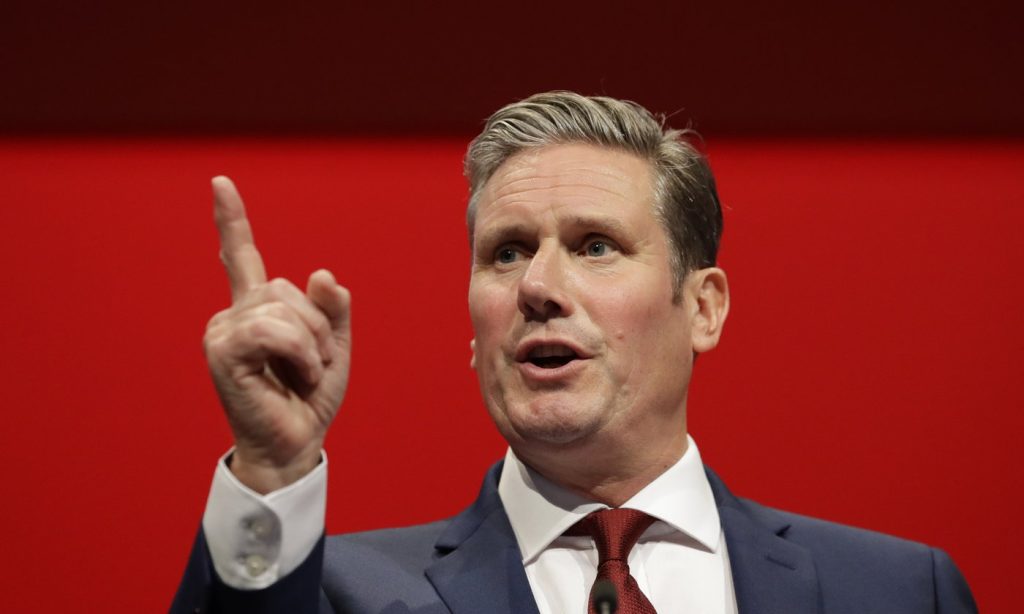Labour leader Keir Starmer is often called dull. But he might be Britain’s next prime minister

Posted May 23, 2024 09:23:22 AM.
Last Updated May 23, 2024 08:26:22 PM.
LONDON (AP) — Dutiful, managerial, a bit dull — Keir Starmer is no one’s idea of a firebrand politician.
The Labour Party hopes that is just what Britain needs. Starmer, the center-left party’s 61-year-old leader, is the current favorite to win the country’s July 4 election.
Starmer has spent four years as opposition leader dragging his social democratic party from the left towards the political middle ground. His message to voters is that a Labour government will bring change — of the reassuring rather than scary kind.
“A vote for Labour is a vote for stability — economic and political,” Starmer said after Prime Minister Rishi Sunak called the election on Wednesday.
If Labour wins the election, Starmer will become the first Labour prime minister since 2010.
A lawyer who served as chief prosecutor for England and Wales between 2008 and 2013, Starmer is caricatured by opponents as a “lefty London lawyer.” He was knighted for his role leading the Crown Prosecution Service, and Conservative opponents like to use his title, Sir Keir Starmer, to paint him as elite and out of touch.
Married with two teenage children, Starmer stresses his everyman credentials, especially his love of soccer and support for the Premier League team Arsenal, and his working-class roots. He is the son of a toolmaker and a nurse who named him after Keir Hardie, the Labour Party’s first leader.
His mother suffered from a chronic illness that left her in pain, and Starmer has said that visiting her in the hospital and helping to care for her left an indelible mark on him and helped form his strong support for the state-funded National Health Service.
Raised in a cash-strapped household in a small town outside London, he was the first member of his family to go to college, studying law at Leeds University and Oxford. He practiced human rights law before being appointed chief prosecutor.
Starmer was elected to Parliament for a central London district in 2015, at an election that saw Labour defeated by the Conservatives. He often disagreed with then-leader Jeremy Corbyn, a staunch socialist, at one point quitting the party’s top team over disagreements, but agreed to serve as Labour’s Brexit spokesman under Corbyn.
Starmer was a strong opponent of Britain’s decision to leave the European Union, though now says a Labour government would not seek to reverse it.
Critics say that shows a lack of political principle. Supporters say it’s pragmatic and respects the fact that British voters have little desire to revisit the divisive Brexit debate.
After Corbyn led Labour to election defeats in 2017 and 2019 — the latter the party’s worst result since 1935 — Labour picked Starmer to lead efforts to rebuild.
His leadership has coincided with a turbulent period that saw Britain go through the COVID-19 pandemic, leave the EU, absorb the economic shock of Russia’s invasion of Ukraine and endure economic turmoil from Liz Truss’s turbulent 49-day term as prime minister in 2022.
Voters are weary from a cost-of-living crisis, a wave of public sector strikes and political turmoil that saw the Conservative Party dispatch two prime ministers within weeks in 2022 — Boris Johnson and Truss — before installing Sunak to try to steady the ship.
Starmer imposed discipline on a party with a well-earned reputation for internal division, ditched some of Corbyn’s more overtly socialist policies and apologized for antisemitism that an internal investigation concluded had been allowed to spread under Corbyn.
Starmer promised “a culture change in the Labour Party.” His mantra is now “country before party.”
Allies say Starmer’s stolid exterior hides a steely ambition and a determination to win. Asked by The Guardian last year what was the worst job he’d ever had, he said “leader of the opposition.”
“As leader of the opposition, you are not in power and it’s the most frustrating job I’ve ever had, and a job I hope I don’t have for much longer,” he said.
Starmer’s challenge is to persuade voters that a Labour government can ease Britain’s chronic housing crisis and repair its fraying public services, especially the creaking health service — but without imposing tax increases or deepening the public debt.
Some on Labour’s left have grumbled at his centrist approach and what they see as unambitious policies. He watered down a pledge to spend billions investing in green technology, saying a Labour government would not borrow more to fund public spending.
But the party has surged in the polls under his leadership, which has helped keep his internal critics onside.
At the party’s conference in October he showed some passion, telling cheering delegates: “I grew up working class. I’ve been fighting all my life. And I won’t stop now.” He also showed remarkable composure when a protester rushed onstage and showered Starmer with glitter and glue.
Some have likened this election to 1997, when Tony Blair led Labour to a landslide victory after 18 years of Conservative rule.
Tim Bale, professor of politics at Queen Mary University of London, said that while Starmer is not a “particularly inspiring Blair-like figure, (he) nevertheless beats Rishi Sunak on almost every single indicator of what people want from a prime minister.”
“He’s not great,” Bale said. “But he’s good enough.”
Jill Lawless, The Associated Press








